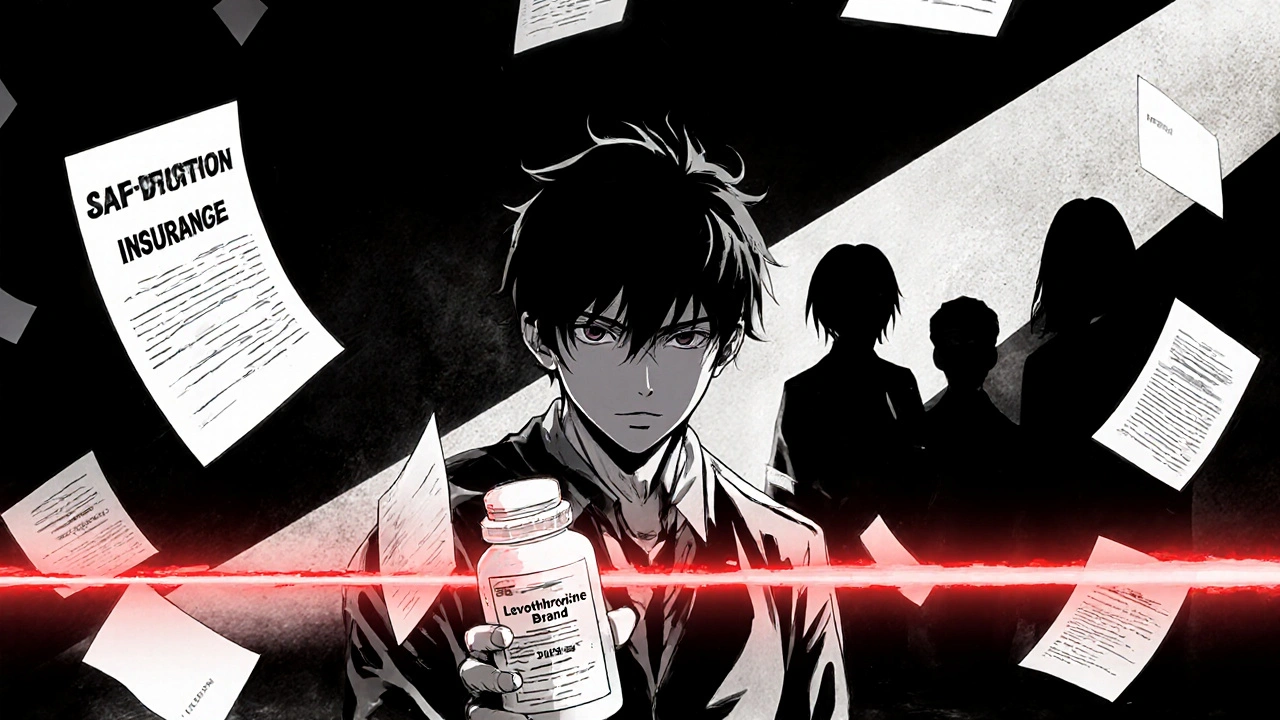Prior Authorization for NTI Drugs: When Insurers Require Brand-Name Medications

When you take a medication like levothyroxine or phenytoin, your body doesn’t just need the right dose-it needs the exact same formula every single time. That’s because these are narrow therapeutic index (NTI) drugs. Even tiny changes in how the drug is made can push your blood levels from safe to dangerous-or from effective to useless. Yet, many insurance plans still force patients to jump through hoops just to get the brand-name version they’ve been stable on for years. Why? And what happens when they do?
What Makes NTI Drugs Different?
NTI drugs have a razor-thin margin between the dose that works and the dose that harms. The FDA defines them as medications where small differences in blood concentration can lead to serious therapeutic failure. That’s not a hypothetical risk. For someone with epilepsy, switching from one brand of carbamazepine to a generic-even one approved by the FDA-can trigger a seizure. For someone with hypothyroidism, a slight shift in levothyroxine absorption can send TSH levels skyrocketing, causing fatigue, weight gain, heart problems, or worse.
There are about 37 known NTI drugs on the market. Most fall into two big categories: anticonvulsants for epilepsy and thyroid hormone replacements. Others include warfarin (a blood thinner), digoxin (for heart rhythm), and lithium (for bipolar disorder). These aren’t niche drugs. Millions of people rely on them daily. And yet, insurance companies often treat them like any other medication with a generic alternative.
Why Do Insurers Even Ask for Prior Authorization?
Insurance companies use prior authorization to control costs. For most drugs, they’ll approve the generic unless there’s a clear medical reason not to. It’s a simple cost-saving rule. But NTI drugs don’t follow that logic. Studies show that switching between brands and generics-even when labeled as bioequivalent-can cause measurable changes in drug levels. One 2024 study of 2,450 epilepsy patients found that 18.7% had more seizures after being forced to switch to a generic. That’s not just inconvenient. It’s dangerous.
Still, many insurers apply the same rules to NTI drugs. They require doctors to submit paperwork, lab results, and sometimes even proof that the patient failed on the generic before they’ll approve the brand. Some plans say they’ll approve the brand if the patient has been stable on it for six months. Others require a new prior authorization every year. And if the doctor misses a form or the fax gets lost? The patient goes without medication until it’s cleared.
The Real Cost of Delays
Processing times for NTI drug prior authorizations are longer than for regular drugs. On average, it takes 3.2 business days just to get a decision. And that’s after the doctor spends hours filling out forms. A 2023 study found that 68% of patients waiting for NTI drug approval faced delays longer than 72 hours. Nearly 30% of those patients reported a direct health impact-hospital visits, seizures, thyroid crashes, or worse.
One neurologist on Reddit shared that 73% of their levothyroxine brand requests were initially denied-even when the patient’s TSH levels had fluctuated by 300% after switching to a generic. That’s not a glitch. That’s a system designed to save pennies, not protect lives.
And it’s not just patients who suffer. Doctors spend an average of 16.3 hours a week just managing prior authorizations. That’s time taken away from patient care. One practice in Ohio estimated they were losing $4,380 per week in staff time just to get approvals for NTI drugs.

Some Insurers Are Getting It Right
Not all plans are stuck in the past. Health Net, for example, explicitly states that brand-name NTI drugs like levothyroxine and carbamazepine do not require prior authorization if they’re on formulary. Other insurers have similar policies, especially for patients who’ve been stable on a brand for over a year.
States are stepping in too. California’s AB-1428, which took effect in January 2025, bans insurers from requiring prior authorization for NTI drugs if the patient has been stable on the same brand for at least 90 days. That’s a game-changer. It removes the bureaucracy for people who don’t need it.
And it’s working. Since the law passed, KFF found that 37% more NTI drug requests are approved on the first try. That’s because the rules are clearer, and the system trusts doctors and patients who’ve already proven stability.
What You Can Do If You’re Being Denied
If your insurer denies your request for a brand-name NTI drug, you’re not powerless. Here’s what works:
- Get your doctor to write a letter of medical necessity. Don’t just check a box. Explain why the generic failed you-or why switching puts you at risk. Include lab results (TSH, INR, drug levels) if you have them.
- Appeal immediately. Most insurers have a 60-day window to respond to an appeal. If they don’t respond in time, many states now require automatic approval.
- Check your state’s laws. As of 2025, 18 states require automatic approval if the insurer misses their deadline. 22 states have special rules for NTI drugs. You can find yours through the National Conference of State Legislatures.
- Use electronic prior authorization. Paper faxes are slow. If your doctor’s office uses an ePA system (like the NCTracks portal or Gainwell), push for it. Electronic requests are processed 42% faster.
- Reach out to patient advocacy groups. Patients Rising and the American Academy of Neurology have templates and support for filing appeals. They’ve helped thousands get their meds approved.

The Bigger Picture: Why This Matters
This isn’t just about pills and prescriptions. It’s about trust. When a patient has been stable on a medication for years-when their life depends on consistency-why should they have to prove they deserve to stay on it? The science is clear: NTI drugs aren’t interchangeable. Insurers who treat them like generic pain relievers are gambling with health outcomes.
Industry analysts predict that by 2026, 75% of commercial insurers will eliminate prior authorization for established NTI drug use. Why? Because the data is overwhelming. The costs of hospitalizations, emergency visits, and lost productivity from medication switches far outweigh the savings from switching to a cheaper generic.
And the legal tide is turning. The Improving Seniors’ Timely Access to Care Act, passed by Congress in 2024, requires Medicare Advantage plans to approve or deny prior authorizations in real time-especially for NTI drugs. That means no more waiting days for a decision when your life is on the line.
What’s Next?
If you’re on an NTI drug, know your rights. Ask your doctor if your insurance has a special policy for these medications. If they don’t, ask them to file a prior authorization with a clear medical rationale. Keep copies of every form, every denial letter, every lab result. You’re not just fighting for a prescription-you’re fighting for stability, safety, and dignity.
And if you’re a provider? Push for policy change. Advocate for your patients. The system is broken, but it’s not unfixable. The data is there. The laws are changing. The patients are counting on you.
What are NTI drugs?
Narrow therapeutic index (NTI) drugs are medications where even small changes in dose or formulation can lead to serious side effects or treatment failure. Examples include levothyroxine for hypothyroidism, phenytoin and carbamazepine for epilepsy, warfarin for blood thinning, and lithium for bipolar disorder. These drugs require precise dosing and consistent formulation to remain safe and effective.
Why do insurers require prior authorization for brand-name NTI drugs?
Insurers often apply standard cost-control rules to NTI drugs, assuming generics are interchangeable. They require prior authorization to limit spending, even though switching brands or generics can cause dangerous fluctuations in blood levels. Some plans still require it out of habit or outdated policy, despite evidence showing increased risk of adverse events.
Can I switch from a brand-name NTI drug to a generic?
Technically, yes-FDA-approved generics are considered bioequivalent. But for NTI drugs, bioequivalence doesn’t guarantee clinical equivalence. Many patients experience changes in symptoms, lab values, or seizure frequency after switching. If you’re stable on a brand, your doctor should advocate to keep you on it. Never switch without medical supervision.
What should I do if my insurance denies my NTI drug request?
File an appeal immediately. Include your doctor’s letter, lab results, and any history of adverse reactions to generics. Check your state’s laws-many now require automatic approval if the insurer misses their deadline. Contact patient advocacy groups like Patients Rising for templates and support. Electronic prior authorization systems can also speed up the process.
Are there states that protect access to brand-name NTI drugs?
Yes. As of 2025, 22 states have laws limiting prior authorization for NTI drugs. California, for example, prohibits prior authorization for patients stable on a brand for 90+ days. Eighteen states require automatic approval if insurers don’t respond within their mandated timeframe. Check your state’s health department or NCSL website for current rules.
How long does prior authorization for NTI drugs usually take?
On average, it takes 3.2 business days to get a decision, but delays are common. Paper submissions can take over a week. Electronic systems reduce this by 42%, but NTI requests still take 22% longer than standard ones due to extra documentation requirements. Some states require a response within 24-72 hours for urgent cases.






Comments
Darragh McNulty
November 20, 2025 AT 15:34This is so important 💔 My cousin had a seizure after switching generics. Doctors don’t get enough time to fight this stuff. Thank you for putting this out there.
Willie Doherty
November 21, 2025 AT 22:53The data is unequivocal: NTI drug substitution introduces clinically significant pharmacokinetic variance. The FDA’s bioequivalence threshold (80-125% AUC) is statistically inadequate for therapeutic safety in this class. Insurers are externalizing risk onto vulnerable populations under the guise of cost containment.
Cooper Long
November 23, 2025 AT 12:30The system prioritizes balance sheets over biological stability. This isn't policy. It's negligence dressed as efficiency
Sheldon Bazinga
November 24, 2025 AT 07:11lol so now we gotta pamper epileptic rich people with brand name pills while the rest of us take generic tylenol like normal folks? #freeenterprise #yallcantaffordthis
Sandi Moon
November 24, 2025 AT 10:25This is just the tip of the iceberg. The pharmaceutical-industrial complex has been quietly engineered to make patients dependent on bureaucratic hurdles. Who owns the ePA systems? Who profits from delays? The same people who own the generics. It's not incompetence. It's design.
Shawn Sakura
November 26, 2025 AT 02:40I know this is hard to believe but… people actually die because of this. I’ve seen it. If your doc says stay on brand, don’t let them push you. You’re not being difficult. You’re being smart. And if they deny you? Fight back. You’ve got this.
Paula Jane Butterfield
November 27, 2025 AT 06:08I’m a nurse practitioner and I’ve had patients cry because they couldn’t get their med for 10 days. One man missed his daughter’s graduation because he was in the ER from a thyroid crash. This isn’t about money. It’s about human dignity. Please, if you’re reading this, write your rep. We need change.
Elaina Cronin
November 28, 2025 AT 17:16The regulatory framework governing NTI drugs is fundamentally flawed. The assumption that bioequivalence equates to clinical equivalence is a dangerous fallacy rooted in economic reductionism. The FDA’s approval process for generics in this class lacks sufficient pharmacodynamic granularity. This is not a policy failure-it is a systemic betrayal of patient autonomy.
Kartik Singhal
November 30, 2025 AT 11:13lol why do you think they make these drugs so expensive? its all a scam. generics are fine. if you cant handle it then maybe you shouldnt be on meds at all. also the government is controlling your brain with lithium
Logan Romine
December 1, 2025 AT 21:35So we're just supposed to trust that a pill made in a factory in Bangalore is the same as the one made in New Jersey because the math says so? Funny. The same math said the Titanic was unsinkable. 🤷♂️💊
Chris Vere
December 2, 2025 AT 02:41The real issue is not the drug but the structure of care. When health becomes a transaction, people become variables. Stability is not a privilege. It is a biological necessity. We have forgotten that medicine is not a commodity. It is a covenant between healer and human.
Pravin Manani
December 3, 2025 AT 00:43The pharmacokinetic variability of NTI generics, particularly in CYP2C9 and CYP2C19 substrates, introduces inter-individual metabolic heterogeneity that is not accounted for in population-based bioequivalence metrics. This is a clear case where therapeutic drug monitoring should be mandatory prior to any substitution, not after a clinical crisis.
Mark Kahn
December 4, 2025 AT 12:29My mom’s been on brand levo for 12 years. They tried to switch her last year. She got dizzy, gained 15 lbs, and couldn’t sleep. Her TSH went from 2.1 to 8.9. Doc fought it. She got her med back. Don’t give up. You’re not alone.
Leo Tamisch
December 5, 2025 AT 11:49Ah yes, the sacred NTI. The one drug class that can’t be touched by the almighty dollar. Except, of course, when it’s convenient for the 1% to have their $200/month pills replaced with $5 generics. The irony is thick enough to spread on toast. 🤡
Daisy L
December 6, 2025 AT 03:57This is a national scandal. People are dying because insurance companies think a 3-cent difference matters more than a life. I’m so furious I could scream. And they wonder why people hate the system? THIS. IS. WHY.